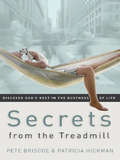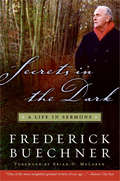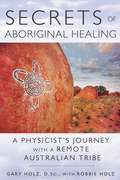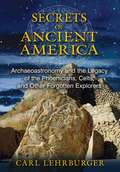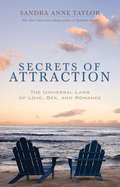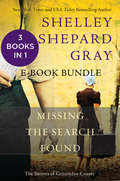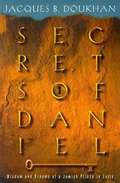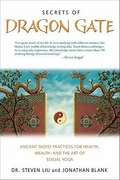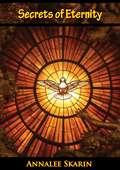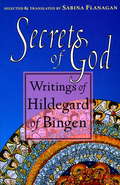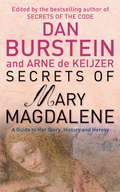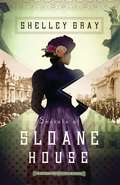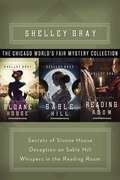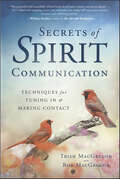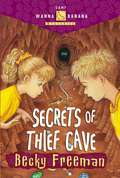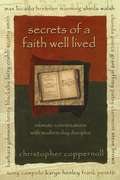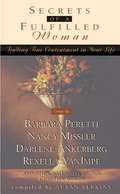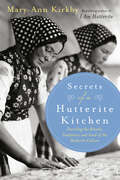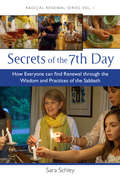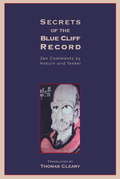- Table View
- List View
Secrets from the Treadmill
by Pete BriscoeWe're all aware of God's commandment to "remember the Sabbath and keep it holy." After all, it's one of the Big 10. But how many of us really observe a Sabbath of rest? More than just a lazy Sunday afternoon, we all need "Sabbaths"-times of reflection and relaxation-in this stressed-out world. With a pastor's experience and insight, and an award-winning writing style, Secrets from the Treadmill presents a rejuvenating plan of rest replenishment to stressed-out, overworked people. Offering practical and spiritual motives to engage in periods of rest, the book also provides realistic solutions for fitting Sabbaths into a busy life. Finally, it includes a chapter devoted to wise "resters" from the Bible.
Secrets in an Amish Garden: An Uplifting Inspirational Romance (Amish Seasons #4)
by Lenora WorthCan love bloom twice in a lifetime…in this novel by New York Times bestselling author Lenora Worth. Working together in her Amish garden Will grow more than just flowers… After losing her first love, Amish garden nursery owner Rebecca Eicher thought she&’d shuttered her heart forever. But when Englisch stranger Jeb Martin asks for work, there&’s an instantaneous connection—almost like Rebecca knows him. But Jeb has a past he&’s been hiding. And when her brother helps play matchmaker, will the truth bring them together or break them apart?From Love Inspired: Uplifting stories of faith, forgiveness and hope.Amish Seasons Book 1: Their Amish ReunionBook 2: Her Amish ChildBook 3: Seeking RefugeBook 4: Secrets in an Amish Garden
Secrets in the Dark: A Life in Sermons
by Frederick BuechnerFrederick Buechner has long been a kindred spirit to those who find elements of doubt as constant companions on their journey of faith. He is a passionate writer and preacher who can alter lives with a simple phrase. Buechner's words, both written and spoken, have the power to revolutionize and revitalize belief and faith. He reveals the presence of God in the midst of daily life. He faces and embraces difficult questions and doubt as essential components of our lives, rather than as enemies that destroy us. "Listen to your life!" is his clarion call. This theme pervades this definitive collection of sermons, delivered throughout Buechner's lifetime. Presented chronologically, they provide a clear picture of the development of his theology and thinking. Reflecting Buechner's exquisite gift for storytelling and his compassionate pastor's heart, Secrets in the Dark will inspire laughter, hope, and bring great solace. Turn the pages and rediscover what it means to be thoughtful about faith. See why this renowned writer has been quoted in countless pulpits and beloved by Americans for generations.
Secrets of Aboriginal Healing: A Physicist's Journey with a Remote Australian Tribe
by Robbie Holz Gary HolzA guide to the 60,000-year-old healing system of the Aborigines revealed through one man’s journey to overcome multiple sclerosis • Written at the request of the Aboriginal people the author stayed with • Explores the use of dreamtime, spirit guides, and telepathy to discover and reprogram the subconscious motivations, thought patterns, and beliefs behind illness • Reveals how to tap in to healing support through the body/mind/spirit connection • Nautilus Silver Medal Winner and ForeWord Reviews Book of the Year Finalist In 1983 award-winning physicist Gary Holz was diagnosed with chronic progressive multiple sclerosis. By 1988 he was a quadriplegic. Then, in 1994, his doctors told him he had two years to live. Desperate and depressed, he followed a synchronistic suggestion and went to Australia to live with a remote Aboriginal tribe. Arriving in a wheelchair, alone, with almost no feeling left from the neck down, Holz embarked on a remarkable healing transformation of body, mind, and spirit and discovered his own gift for healing others. Written at the request of the Aboriginal healers Holz worked with, this book reveals the beliefs and principles of the 60,000-year-old healing system of the Aborigines of Australia, the world’s oldest continuous culture. Chronicling the step-by-step process that led to his miraculous recovery, he explains the role played by thought in the creation of health or disease and details the five essential steps in the Aboriginal healing process. He explores the use of dreamtime, spirit guides, and telepathy to discover and reprogram the subconscious motivations behind illness--a process that enacts healing at the cellular and the soul level, where the root of physical illness is found. Supported by modern science, including quantum physics, Aboriginal medicine enables each of us to tap in to healing support through the power of the body/mind/spirit connection.
Secrets of Ancient America: Archaeoastronomy and the Legacy of the Phoenicians, Celts, and Other Forgotten Explorers
by Carl LehrburgerThe real history of the New World and the visitors, from both East and West, who traveled to the Americas long before 1492 • Provides more than 300 photographs and drawings, including Celtic runes in New England, Gaelic inscriptions in Colorado, and Asian symbols in the West • Reinterprets many archaeological finds, such as the Ohio Serpent Mound • Reveals Celtic, Hebrew, Roman, early Christian, Templar, Egyptian, Chinese, and Japanese influences in North American artifacts and ruins As the myth of Columbus “discovering” America falls from the pedestal of established history, we are given the opportunity to discover the real story of the New World and the visitors, from both East and West, who traveled there long before 1492. Sharing his more than 25 years of research and travel to sites throughout North America, Carl Lehrburger employs epigraphy, archaeology, and archaeoastronomy to reveal extensive evidence for pre-Columbian explorers in ancient America. He provides more than 300 photographs and drawings of sites, relics, and rock art, including Celtic and Norse runes in New England, Phoenician and Hebrew inscriptions in the Midwest, and ancient Shiva linga and Egyptian hieroglyphs in the West. He uncovers the real story of Columbus and his motives for coming to the Americas. He reinterprets many well-known archaeological and astronomical finds, such as the Ohio Serpent Mound, America’s Stonehenge in New Hampshire, and the Crespi Collection in Ecuador. He reveals Celtic, Hebrew, Roman, early Christian, Templar, Egyptian, Chinese, and Japanese influences in famous stones and ruins, reconstructing the record of what really happened on the American continents prior to Columbus. He also looks at Hindu influences in Mesoamerica and sacred sexuality encoded in archaeological sites. Expanding upon the work of well-known diffusionists such as Barry Fell and Gunnar Thompson, the author documents the travels and settlements of trans-Atlantic and trans-Pacific explorers, miners, and settlers who made it to the Americas and left their marks for us to discover. Interpreting their sacred symbols, he shows how their teachings, prayers, and cosmologies reveal the cosmic order and sacred landscape of the Americas.
Secrets of Attraction: The Universal Laws Of Love, Sex, And Romance
by Sandra Anne TaylorIn this uniquely fascinating book, Sandra Anne Taylor reveals how the Universal Laws—and even quantum physics—actually direct the course of your relationship destiny. Energy is the center of all life, and your energy is the center of all that you attract. You project this energy ahead of you in time and space, magnetically determining whom you will meet, as well as what the dynamics of any particular relationship will be like. In Secrets of Attraction, you’ll discover what makes up your personal energy field, how you broadcast it, and why it has much more impact on your relationships than your looks, intellect, or financial status. No matter what you’ve been through in the past, you do have the power to change your relationship energy and manifest the intimacy, reciprocity, and true love that has been eluding you for so long!
Secrets of Crittenden County
by Shelley Shepard GrayJoin New York Times and USA Today bestselling author Shelley Shepard Gray for a visit to Amish Country! Get all three novels in Shelley Shepard Gray's The Secrets of Crittenden County series in one e-book, including: Missing, The Search, and Found. The Secrets of of Crittenden County trilogy delivers page-turning romance and mystery involving a death from mysterious circumstances that invites the scrutiny of the outside world, all set in the quiet Amish community of Crittenden.
Secrets of Daniel: The Wisdom and Dreams of a Jewish Prince in Exile
by Jacques B. DoukhanUnderstand Daniel as never before. Drawing from his research in ancient Jewish sources and knowledge of the original language, Doukhan recreates the world of Babylon, explains obscure allusions, and finds hidden patterns within the prophecies that clarify their meaning.
Secrets of Dragon Gate
by Steven Liu Jonathan BlankFrom simple breathing exercises that make you feel healthier and more alive to advanced sexual yoga, The Secrets of Dragon Gate is the key to your unique path to health, wealth, and spiritual fulfillment. The Dragon Gate School is known for its singular combination of sexual yoga and dream yoga practices; mystical divination methods for choosing a wise and fruitful path; Chi-gung and martial arts practices for health and longevity; and profound philosophy, based on the I Ching (Book of Changes) and the five elements, that provides a deep insight into the nature of reality. Incorporate the mysterious and ancient wisdom of the Dragon Gate School of Taoism into your daily life, and find answers to the question of how to live a long, prosperous, and happy life.
Secrets of Eternity
by Annalee Skarin“My increasing love has been the reward for my efforts, for my love is great and my vision true. All that I have I give freely to the world. I seek no credits or rewards. I only ask that men read that which God has revealed through me in humble prayer. If man will but be as prayerful in reading as I have been filled with humble prayer in the writing, then there is still hope for the world.“And so, beloved ones of earth, I say, come stand with me upon the mountain top and permit me to show you the cause of the darkness that it might be dispelled. Let me lead you to the great Christ Light that you might step out into its glory and abide in the new day.“With compassionate love, unfeigned and true, I reach out to tear asunder the veil of the “Gross darkness that has covered the earth and blinded the minds of the people.” With love and tenderness increased a thousand-fold, I will reveal first the weaknesses and the evils and the errors and deceits contained within the earthly mire that you might fully comprehend the issues involved and so step forth into His great Light, redeemed and glorified.”—Annalee Skarin
Secrets of God: Writings of Hildegard of Bingen
by Hildegard Of BingenVisionary, mystic, poet, musician, naturalist, healer, theologian--the Rhineland nun Hildegard of Bingen (1098-1179) was a Renaissance woman long before there was a Renaissance. This is the first book in English to offer a representative selection of writings from all of her amazing range of work. Hildegard wrote many volumes on subjects from mystical vision to sexuality, from theology to natural medicine--in letters, treatises, poetry, and songs--all in an age when few women wrote more than an occasional letter. She was a woman of extraordinary influence whose work not only surpassed that of her male contemporaries in its range, but also outshone them in visionary beauty and intellectual power. This collection includes a brief biography of Hildegard, and selections from the following works: * Scivias (literally, "know the ways"), the record of Hildegard's visions and her commentary on them * The Book of Life's Merits, visionary work * The Book of Divine Works, a work of cosmology and anthropology * Natural History, a record of plants, animals, and minerals, translated here into English for the first time * Causes and Cures, a compendium of her writing on natural medicine * Symphonia, her songs and poetry * Biographical works * Selected letters
Secrets of Kundalini in Panchastavi
by Gopi KrishnaPanchastavi is a unique hymn of praise to Kundalini, the Cosmic Life-Force behind Yoga and all the marvelous paranormal phenomena associated with it.
Secrets of Mary Magdalene
by Dan BursteinA dazzling look at the most elusive figure in Christ's lifeMary Magdalene was a key figure in Christ's life. She was present at his Crucifixion and she was also the first person to see him resurrected. According to Dan Brown's multi-million selling THE DA VINCI CODE, she was also his wife and the mother of his children. In the Gospels, she is described as an outcast and a harlot. This may be due to the disciples' jealousy of Jesus' love for Mary and the closeness of his relationship with her that was not replicated in his relationships with them. In SECRETS OF MARY MAGDALENE, Dan Burstein explodes the myths and analyses who Mary Magdalene was, the true nature of her relationship with Christ and her role in the Christian faith. Did Mary write her own Gospel? If so, what did it say? Where did she come from? Was she Jewish? How did she live? So many questions exist about this lady, Google can find mention of her on 1,740,000 sites in 0.3 seconds. This book will find the answers.
Secrets of New Babylon (Left Behind: The Kids #21)
by Tim Lahaye Jerry B. Jenkins Chris FabryA startling discovery awaits Judd Thompson in New Babylon. Judd's friend lies gravely ill from a mysterious illness while Lionel and Samuel try to get home. Back in the States, Vicki Byrne desperately tries to warn believers of Global Community arrests. Is there really an impostor luring believers into a trap? Follow the Young Trib Force as they struggle to escape the tightening GC grip.
Secrets of Sloane House (The Chicago World’s Fair Mystery Series #1)
by Shelley GrayAgainst the backdrop of the 1893 World&’s Fair, a new kind of crime comes to Gilded Age Chicago . . . and a lonely young woman is always at risk.Back on the farm in Wisconsin, Rosalind&’s plan had seemed logical: Move to Chicago. Get hired on at Sloane House, one of the most gilded mansions of Chicago. Discover what transpired while her sister worked as a maid there—and follow the clues to why she disappeared.Now, as a live-in housemaid to the Sloanes, Rosalind realizes her plan had been woefully simple-minded.She was ignorant of the hard, hidden life of a servant in a big, prominent house; of the divide between the Sloane family and the people who served them; and most of all, she had never imagined so many people could live in such proximity and keep such dark secrets.Yet, while Sloane House is daunting, the streets of Chicago are downright dangerous. But when Rosalind accepts the friendship of Reid Armstrong, the handsome young heir to a Chicago silver fortune, she becomes an accidental rival to Veronica Sloane.As Rosalind continues to disguise her kinship to the missing maid—and struggles to appease her jealous mistress—she probes the dark secrets of Sloane House and comes ever closer to uncovering her sister&’s mysterious fate. A fate that everyone in the house seems to know . . . but which no one dares to name.&“Gray writes with honesty, tenderness, and depth. Her characters are admirable, richly layered, and impossible to forget long after the story is done.&” —Jillian HartPart of the Chicago World&’s Fair Mystery series:Book one: Secrets of Sloane HouseBook two: Deception on Sable HillBook three: Whispers in the Reading RoomBook length: approximately 95,000 wordsIncludes discussion questions for book clubs
Secrets of Sloane House: Secrets of Sloane House, Deception on Sable Hill, and Whispers in the Reading Room (The Chicago World’s Fair Mystery Series)
by Shelley GrayAgainst the backdrop of the 1893 World’s Fair, a young woman finds employment with an illustrious Chicago family—a family who may guard the secret of her sister’s disappearance. Sloane House is among the most gilded mansions of Gilded Age Chicago. Rosalind Perry, the new housemaid, pours the morning coffee before the hard gaze of her mistress. “It’s simple, Rosalind,” she says. “I am Veronica Sloane, heiress to one of the country’s greatest fortunes. You are simply one in a long line of unsuitable maids.” Back on the farm in Wisconsin, Rosalind’s plan had seemed logical: Move to Chicago. Get hired on at Sloane House. Discover what transpired while her sister worked as a maid there—and follow the clues to why she disappeared. Now, as a live-in housemaid to the Sloanes, Rosalind realizes her plan had been woefully simple-minded. She was ignorant of the hard, hidden life of a servant in a big, prominent house; of the divide between the Sloane family and the people who served them; and most of all, she had never imagined so many people could live in such proximity and keep such dark secrets. Yet, while Sloane House is daunting, the streets of Chicago are downright dangerous. The World’s Fair has brought a new kind of crime to the city . . . and a lonely young woman is always at risk. But when Rosalind accepts the friendship of Reid Armstrong, the handsome young heir to a Chicago silver fortune, she becomes an accidental rival to Veronica Sloane. As Rosalind continues to disguise her kinship to the missing maid—and struggles to appease her jealous mistress—she probes the dark secrets of Sloane House and comes ever closer to uncovering her sister’s mysterious fate. A fate that everyone in the house seems to know . . . but which no one dares to name.
Secrets of Spirit Communication: Techniques for Tuning In & Making Contact
by Trish MacGregorDiscover the Power of Synchronicity and the Methods that Connect You to Loved Ones in SpiritSpirits communicate with us every day, especially the spirits of our loved ones—but are you tuning in to them? Secrets of Spirit Communication is your go-to guide for identifying and interpreting the signs, symbols, and synchronicities around you. Whether it's an object, sound, scent, dream, or pattern, this book will help you understand what it means and how to respond.Featuring numerous stories of real-life spirit contact, Secrets of Spirit Communication also provides techniques and exercises for raising your awareness of spirits and effectively communicating with them. You'll learn about meditation, power animals, how to use altered states, and the five main methods to fully engage with spirit: awareness and recognition, intention, summoning through desire, requesting, and incubation. This inspiring book makes spirit communication comfortable and easy, helping to confirm that those in spirit are right beside you.Praise:"This powerful and beautifully written book about spirit contact moved me deeply...[It] is filled with inspiring stories that will make you think, will open your mind to wonder, and will bring you joy."—Whitley Strieber, author of The Afterlife Revolution"The MacGregors—who have written extensively on synchronicity—state in this book that the 'language of the dead is synchronicity,' which is a profound discovery."—Peter Levenda, author of Stairway to Heaven
Secrets of Their Past: An Uplifting Inspirational Romance (Wander Canyon #5)
by Allie PleiterFacing the past could change his future. Veterinarian Neal Rodgers is in Wander Canyon seeking the truth about his past—not to rescue a litter of kittens under his next-door neighbor&’s porch. But persistent single-mom Tessa Kennedy is impossible to ignore—especially when she uncovers a family secret of her own. Discovering the hidden facts of their histories could be the key to unlocking everything in this small town.From Love Inspired: Uplifting stories of faith, forgiveness and hope.Wander Canyon Book 1: Their Wander Canyon WishBook 2: Winning Back Her HeartBook 3: His Christmas WishBook 4: A Mother's StrengthBook 5: Secrets of their Past
Secrets of Thief Cave (Camp Wanna Bannana #2)
by Becky Freeman David ClarWhen you live at the best Christian youth camp around-Camp Wanna Banana-life is filled with adventure, excitement-and fun! Join ten-year-old twins Jake and Joy; Joy's pet spider monkey, Munch-Munch; and their "twibling" friends, Marco and Maria, as they solve a whole series of mysteries in and around Camp Wanna Banana.Who Is Stealing All the Jewelry around Camp Wanna Banana? When Joy's antique gold locket disappears, she's sure her crazy brother has done something silly with it. So Jake-a proud member of the Four Amigos Detective Agency-sets out to catch the real jewel thief and clear his name! But Jake has his work cut out for him. Pretty soon, lots of things are disappearing around Camp Wanna Banana. And that's just the beginning of their troubles, because it looks like money problems just might force Jake and Joy's father to close their beloved camp for good. Can Jake prove his innocence? Can he help find a way to save Camp Wanna Banana? Can God provide a way out of all this mess? The answer lies in the Secrets of Thief Cave! INCLUDES FUN ACTIVITY PAGES FOR YOUR OWN ADVENTURES!From the Trade Paperback edition.
Secrets of a Faith Well Lived
by Christopher CoppernollAs you admire from afar the Christian leaders of our time, do you ever wonder what it would be like to live their lives, to think their thoughts, to believe their faith? This fascinating book by Christ Coppernoll brings their opened hearts to the printed page. Through the close up lens of personal interviews with best-selling authors Max Lucado, Frank Peretti, Sheila Walsh, Scotty Smith, Tony Campolo, Patsy Clairmont, and more, you will glimpse the intimate secrets of faith that have shaped these influential men and women. In the pages of this book, you are invited to share in candid conversations with modern-day disciples and learn firsthand about their struggles, their families, their mission, their dreams, and their hearts.
Secrets of a Fulfilled Woman
by Susie PerkinsAccording to the plan, the marriage was supposed to be elegant. The Children, accomplished. The woman behind it all...complete and delighted, with a fragrant life. But then a pregnancy went horribly wrong. A business failed. "Things happened," here and there, a little at a time. Ten years in, life was adequate, but not the way the original vision promised. Familiar with this scenario? The ladies brought together for Secrets of a Fulfilled Woman know how the script can be written. They don't rely on talk-show queens, magazine secrets, or marriage-encounter fads. Instead, women like Barbara Peretti and Rexella Van Impe long ago began to rely on Jesus Christ as the author and finisher of their faith. It is for that reason the fulfilled life of a woman is attainable. These high-profile women will make you feel hopeful, like you were sitting down over a cup of coffee to discuss how your life can stay on track. Their stories are true and inspiring and able to show how careers, personal lives, spirituality...all of it...are attainable goals.
Secrets of a Hutterite Kitchen: Unveiling The Rituals Traditions And Food Of The Hutterite Cultu
by Mary-Ann KirkbyThe highly anticipated follow-up to the award-winning national bestseller, I Am HutteriteIn I Am Hutterite, Kirkby took her readers on a fascinating journey inside a Hutterite colony in Manitoba, where she grew up. Known as Canada&’s forgotten people, Hutterites live in higher numbers in Canada than anywhere else in the world. Drawing back the curtains on this mysterious and extraordinary way of life, Kirkby enchanted the public with a vivid portrait of her people, rich in detail and memorable characters. Could you go back? was the enduring request from her readers, hungry for more.Now in Secrets of a Hutterite Kitchen, Kirkby returns to her roots and into the heart of the community and the life she was born into. She traveled from colony to colony for more than two years, working with the women in their kitchens: cooking, baking, plucking ducks, and gossiping. Kirkby reveals intimate details of the community and experiences what her life would have been like if her family hadn&’t left the colony when she was a young girl.Secrets of a Hutterite Kitchen is a candid snapshot of present-day Hutterite life, unraveling the inner workings of this closed society and unveiling the rituals, traditions, and food of her culture through the lens of the community kitchen. Kirkby witnesses the rites of passage from cradle to grave: births, romantic entanglements, marriage ceremonies, sacred holidays, and other celebrations. Through it all, she rediscovers what she has always known—that it is the Hutterite women who are the soul of their community.
Secrets of the 7th Day
by Sara SchleyLife is hectic. Moms, dads, kids - all of us - are running at breakneck speed. We need to find ways to be renewed-as individuals, as families and in our communities. Sara Schley, who runs at her own breakneck speed as wife and mother of twins while leading a successful company consulting to businesses on sustainability, has found soul-saving-sanity and renewal through her family's observance of the Jewish Sabbath (Shabbat). Inspired by a non-Jewish friend who said, "Sara there is no center in our lives, you have to teach us how to do Shabbat!", Sara has written Secrets of the 7th Day, the first book of her Radical Renewal series, about how everyone can learn from this ancient Jewish ritual, whether or not they are Jews or even religious. The practice of unplugging from the world, slowing down, sharing in the simple joys of food, stories, songs and the outdoors can be celebrated by all. Secrets of the 7th Day invites all of us to make these beautiful practices for renewing the spirit our own. Ancient as the Sabbath is, we need it now more than ever.
Secrets of the 7th Day
by Sara SchleyLife is hectic. Moms, dads, kids - all of us - are running at breakneck speed. We need to find ways to be renewed-as individuals, as families and in our communities. Sara Schley, who runs at her own breakneck speed as wife and mother of twins while leading a successful company consulting to businesses on sustainability, has found soul-saving-sanity and renewal through her family's observance of the Jewish Sabbath (Shabbat). Inspired by a non-Jewish friend who said, "Sara there is no center in our lives, you have to teach us how to do Shabbat!", Sara has written Secrets of the 7th Day, the first book of her Radical Renewal series, about how everyone can learn from this ancient Jewish ritual, whether or not they are Jews or even religious. The practice of unplugging from the world, slowing down, sharing in the simple joys of food, stories, songs and the outdoors can be celebrated by all. Secrets of the 7th Day invites all of us to make these beautiful practices for renewing the spirit our own. Ancient as the Sabbath is, we need it now more than ever.
Secrets of the Blue Cliff Record: Zen Comments by Hakuin and Tenkei
by Thomas ClearyThe Blue Cliff Record is a classic text of Zen Buddhism, designed to assist in the activation of dormant human potential. The core of this extraordinary work is a collection of one hundred traditional citations and stories, selected for their ability to bring about insight and enlightenment. These vignettes are known as gongan in Chinese and koan in Japanese. Secrets of the Blue Cliff Record is a fresh translation featuring newly translated commentary from two of the greatest Zen masters of early modern Japan, Hakuin Ekaku (1685-1768) of the Rinzai sect of Zen and Tenkei Denson (1648-1735) of the Soto sect of Zen. This translation and commentary on The Blue Cliff Record sheds new light on the meaning of this central Zen text.
